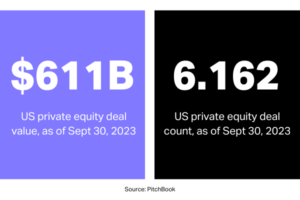Private equity deals, encompassing a spectrum of private equity investments and transaction types, serve as a cornerstone for private equity firms and funds looking to achieve extraordinary returns. These transactions, which range from leveraged buyouts to growth equity investments, are often complex but hold the potential for significant rewards. They are a crucial part of a private equity company‘s toolkit, enabling fund managers and PE firms to navigate the intricacies of the market, optimize deal volume, and ensure a steady flow of capital.
DOWNLOAD A LIST OF THIS YEAR’S BIGGEST PRIVATE EQUITY DEALS SO FAR
In this blog post, we delve into the full landscape of private equity (PE) deals, highlighting how PE firms manage their deal flow and leverage various transaction types to meet strategic goals. With a spotlight on leveraged buyouts, growth equity, and take privates, we illustrate the diversity of private equity investments that fuel the industry’s growth. Additionally, we discuss how effective deal sourcing strategies enable private equity funds to identify and execute the top PE deals, showcasing the innovative approaches that set leading PE funds apart. This exploration aims to provide an overview of the types of private equity investments, offering insights into how PE firms and funds are navigating the competitive market to secure success.
If you’re eager to stay up to date with the latest private equity trends and transactions, be sure to download our list of the biggest and most recent private equity deals.

Recent private equity deals of 2023 and 2024
The private equity market is experiencing a slowdown compared to years past, with fundraising, deal pipelines, and exits quieting down. That said, 2023 still saw some impressive recent private equity deals, particularly in the taking private of public companies. 2024 is sure to contain some large and exciting deals as well.
Read on for the five biggest private equity deals of 2023, and keep an eye out for our updates covering 2024 private equity deals. To dig in to the rest of the list, download it here.
Toshiba
Value: $15B
Type: Take private
Deal announcement date: March 23, 2023
Sponsors: Japan Industrial Partners
Qualtrics
Value: $12.5B
Type: Take private
Deal announcement date: March 13, 2023
Sponsors: Silver Lake, Canada Pension Plan Investment Board (CPPIB)
Worldpay
Value: $11.4B
Type: Leveraged buyout
Deal announcement date: July 6, 2023
Sponsors: GTCR
Univar
Value: $8.1B
Type: Take private
Deal announcement date: March 13, 2023
Sponsors: Apollo Funds
Coupa Software
Value: $8B
Type: Take private
Deal announcement date: February 28, 2023
Sponsors: Thoma Bravo, Abu Dhabi Investment Authority
Textainer Group Holdings Limited
Value: $7.4B
Type: Take private
Deal announcement date: October 22, 2023
Sponsors: Stonepeak
Stripe
Value: $6.5B
Type: Growth equity
Deal announcement date: March 15, 2023
Sponsors: Andreessen Horowitz, Baillie Gifford, Founders Fund, General Catalyst, MSD Partners, and Thrive Capital, GIC, Goldman Sachs Asset and Wealth Management, and Temasek
Maxar
Value: $6.4B
Type: Take private
Deal announcement date: May 3, 2023
Sponsors: Advent International, British Columbia Management Corporation
Guidehouse LLP
Value: $5.3B
Type: Buyout
Deal announcement date: November 6. 2023
Sponsors: Bain Capital Credit
Cvent
Value: $4.6B
Type: Buyout
Deal announcement date: March 14, 2023
Sponsors: Blackstone, Abu Dhabi Investment Authority
Common types of private equity deals
Private equity managers have many options when it comes to structuring a private equity deal. These are some of the most common types of transactions seen in the private equity market.
DOWNLOAD OUR PRIVATE EQUITY REPORTING KIT
Buyouts
A buyout occurs when a private equity manager, on its own or teamed up with other parties, buys up an entire mature company as an investment. Typically, it will hold the company over the course of several years before exiting that investment by selling to another party or pursuing an IPO.
There are a couple different types of buyouts that we often see in private equity:
- Take private – A take private involves buying out a company that is publicly listed on a stock exchange. The company is taken off the exchange and its shareholders are paid by the private equity firm financing the buyout.
- Private company buyout – In a private company buyout, a private equity firm purchases a controlling stake in a privately owned company. It will hold the company for several years before exiting the investment via a sale or an IPO.
- Leveraged buyout – In a leveraged buyout, a private equity firm purchases a company with a combination of equity and debt financing. Often, debt makes up a much larger portion in the debt/equity ratio, and the loans are secured with the acquired company’s assets as collateral on those loans.
Growth equity
A growth equity investment involves providing capital to a mature portfolio company for the purpose of helping it expand. Meanwhile, the investment manager takes a minority stake in the company.
Venture capital
Venture capital is a form of private equity in which a manager makes an investment in a startup, as opposed to a more mature organization. As opposed to more traditional private equity transactions, the capital injections tend to be smaller amounts and start off with a “seed round” and subsequent series by letter – series A, series B, etc. Investing in venture capital is known to bring higher risk compared to traditional private equity since managers invest in ideas rather than mature product lines or services, but the payoff associated with this risk can be great.
Download our list of biggest private equity deals this year
Want to download our full list of recent private equity deals for your own reference? Fill out the form below.


